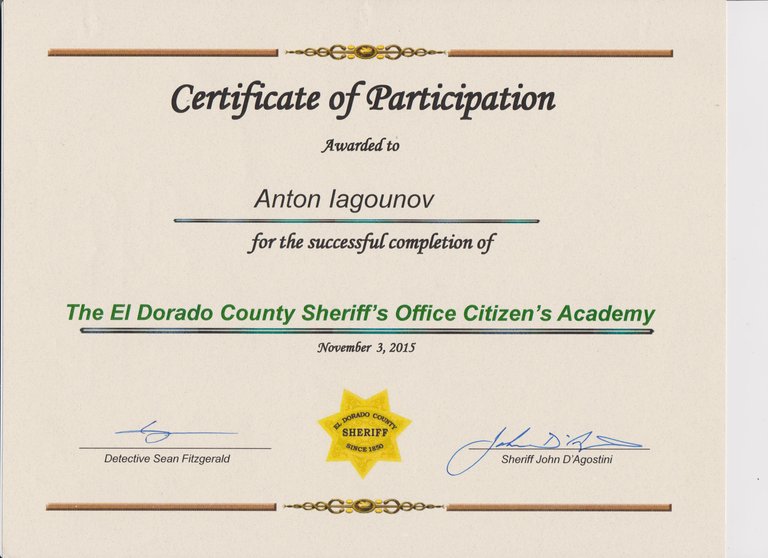In 1994, the United States Department of Justice established a community program called COPS, or Community Oriented Policing Services, which was a provision in the 1994 Violent Crime Control and Law Enforcement Act that established guidelines on what is known as Community Oriented Policing.
COPS is also a program which provides police and sheriff's departments with grants, training, tools, and other incentives in exchange for their participating in the program, which is aimed at building better relations with their respective community. The idea is that communities and law enforcement should have good relations and see one another as being on the same team, thus, COPS was designed to bridge the gap between local law enforcement agencies and the public, making law enforcement's job easier by building better relations between authorities and the community which they serve.
In response to COPS, many police and sheriff departments have established their very own citizens academy, which is open to all members of the public, and provides attendees with familiarity courses that have been designed to educate the public on what it is that their local police or sheriff department does. This is also a great opportunity for law enforcement agencies to show how the public's money is being spent and put to use, since law enforcement agencies are publicly funded, be it through the state, county, city, or a combination thereof.
In 2015, while working as a casino Security Officer, and actively pursuing a job in law enforcement, I learned about the El Dorado Sheriff's Citizens Academy, which was being run by my local Sheriff's Department (EDSO) in the Lake Tahoe, California area, so I signed up. I remember being excited about attending the citizens academy, as during those days I was becoming increasingly interested in doing police work. When I told everyone at work about the citizens academy, most people laughed and brushed it off as some kind of "wannabe" activity for wannabe cops. Even one of my Sergeants and Training Officers from the casino thought it was a waste of time, and questioned "Do you think that's going to help you out in law enforcement?" And the answer is, that later on down the line it did, as training and experience of any kind which is pertinent to the work you pursue will ultimately reflect back on your ambitions about the job which are seeking. Not to say that attending a citizens academy is going to get you a cop job overnight, but it did help me land a work as a Correctional Officer with the State of Nevada.

The El Dorado Sheriff's Citizens Academy was a 12-week academy, which was basically a condensed summary version of a real Sheriff's academy, but custom tailored to suit the public's educational needs, thus, only provides a basic familiarity of police work, and an agency's departmental functions.
Beginning August 18th, 2015, and all the way up until November 3rd, 2015, attendees, which consisted of folks from our local community and from diverse backgrounds which varied from all different walks of life, would gather together once a week, usually lasting from 2-3 hours per academy session, to meet with various members from the Sheriff's department who would give a presentation to attendees about their work and experience with the El Dorado Sheriff's Department.

El Dorado County Sheriff's SWAT Vehicle.
The class schedule consisted in learning domains in the areas of; Communications/Dispatch, Patrol, Volunteer and Chaplin Services, Property, Use of Force, Specialized Weapons and Tactics (SWAT), Crime Scene Investigations and Demonstration, Law of Arrest, Detectives, Internet Safety, Narcotics, Public Records, Jail Operations, Gangs, K-9 Presentation, Traffic Stop Introduction and Patrol, and a Graduation Ceremony and Pot Luck. Oh, and with successfully participating the academy, you also get a pocket size copy of the U.S. Constitution, a mini Sheriff's badge (as emphasized by Detective Sean Fitzgerald the mini-badge is not to be abused or misused, lol), and a Certificate of Participation to add to your book of professional certificates which can help you score some extra points in when applying for work as security or law enforcement.
The Academy also included a Ride-A-Long program, whereby citizens where given the opportunity to ride with a deputy sheriff for an entire shift, responding to every call to which your assigned Ride-A-Long Deputy was dispatched too. Given I was working full-time during the evenings, and attending the academy on my days off, I was given the option to go on a Ride-A-Long after completing the academy, which I did, and had the pleasure of riding along with, at that time Deputy Mathew Harwood, who's now Sergeant. A man after my own heart, as I found that he and I shared many similarities, though coming from completely different backgrounds.
The El Dorado Sheriff's Citizens Academy was a fantastic learning experience, and a once in a life time opportunity, even for those who are not following a career path in law enforcement, it really does give individuals a better understanding of police work, and what those who have taken an oath to serve and protect our communities have to endure as a part of their job description. I also had the pleasure and opportunity to meet Sheriff John D'Agostini, along with all the other great men and women who serve our county and community who either gave a presentation, coordinated, organized, or in someway made the citizens academy possible.
From a security industry perspective, and in pursuit of work in law enforcement, attending this particular academy most defiantly provides the education and direction necessary to place students ahead of their league, as attendees learn about certain law enforcement nomenclature, and procedures which can be extremely useful to even those working security. From learning about 10 Codes, law, and even the psychology of negotiations, for those yearning for knowledge and for those who listen, the El Dorado Sheriff's Citizens Academy can be a life changing experience. After all, it was during this academy that I learned about certain law enforcement publications, including those of the FBI, which shed much light on the nature of the psychology behind law enforcement related activities which our men and women who serve have to deal with on a day to day basis.
Also, much of what I learned from the citizens academy would later be of use in my work as a Correctional Officer for the State of Nevada, U.S. Officer for the Transportation Security Administration, and as a Security contractor for the Federal Emergency Management Agency. That's not to mention the valuable learning which can be applied when testing out for various agencies, as the citizens academy will familiarize students with a certain kind of thought process which is necessary for anyone looking to go into law enforcement.
I won't go into too much detail and spoil the citizens academy experience, and though I am sure each citizens academy varies from one agency to another, the basics remain the same, and it is important that anyone wishing to attend have the right mindset and intentions, and really make the most of such by engaging and interacting with academy activities so much as possible, as doing so will maximize your benefit from the citizens academy, as the academy really is what you make of it. So, for those that are patient, and are willing to lend their attention span to what is probably one of the best learning experiences that you will ever have, then I would greatly encourage everyone interested to sign up for your local citizens academy, be it with a sheriff's or police department, and if you are in the El Dorado County, California area, then EDSO's Citizens Academy is a must try.